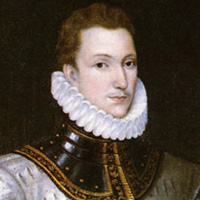Ye Goatherd Gods by Philip Sidney: Summary and Analysis
Ye Goatherd Gods was published posthumously in 1593 in The Countess of Pembroke's Arcadia. It is a pastoral poetry, where two shepherds happened to love the same lady, but, unfortunately, she left both of them and they were heartbroken and became sad. They complaint to the Gods and to the nature for the pain they have because of the dejection of the lady. They cannot see any happiness in the world as they are blindfolded due to severe emotional pain.

Sir Philip Sidney (1554-1586)
When the poem opens Strephon, one of the lovers, speaks to Gods and nymphs to listen to him because his grieves come in the morning and live with him through all the evening. A grand setting of landscape of valleys, grass and woods is presented in this opening stanza. In the second stanza, Klaius other lover in the poem appears with the same pain. He requests to Mercury, Diana and Venus listen to his complaining music. In the third stanza, Strephon recollects his old days in the forest where he used to be relaxed and cheerful. He was loved and was popular for his music, but sadly now he is exiled because of his gloom and pain. The days of happiness and merrymaking are lost for him and for him his own music is like a cry of an owl. In the similar manner, Klaius in the next stanza, recalls his golden days of hunting in the forest. His point of view towards the same beautiful world has changed now. He thinks that everything has turned into a dark and becomes impossible for him to conquer. He believes his sorrow and crying have replaced the sonorous music in the valley.
The pessimistic tone is found in the fifth stanza when Strephon compares his song to the swan song. It is believed swan only sing before its death. He wakes up with the sorrowful mourning and his thoughts have become barren opposite to the fertile forest. Klaius in the sixth stanza further says that he hates both morning and evenings. His thoughts are like wild animals who wander aimlessly throughout the day. He wishes he would he better id he died and buried under the mountain.
Strephon is now viewing the magnificent mountain as a flat and barren valley. He compares himself with the flattened and dejected mountain. The song of the nightingale and owl in the forest is intermingled for him and instead of solacing morning serenity of the cold evening dampens his soul. Klaius also feels the same change in the nature because of his own pain. The scent of the flowers has become odor and the beautiful music of the morning have been the dreadful cries of the men being killed in the forest.
In extreme anger, Strephon likes to set fire in the forest. He curses the one who invents music and hates every part of the day and night. But, Klaius curses himself and does not wish to see next evening. In the next stanza, finally Strephon directly talks about the lady they love. She is Urania, the Greek Goddess of muses. Strephon says that the lady makes music, and it is faultless. Her beauty is beyond comparison and her majesty beats the mountain. The beautiful and enchanting landscape is nothing in front of him. But, she left him, he is like a castaway from the light and life. Klaius says that her smallest sound brings music into existence, and her actions order the actions of the heavens and the abundance of the meadows.
In the concluding stanza, both shepherds say that the surrounding environment will witness their sorrow and pain of separation. Both Strephon and Klaius take a long time to clarify why they are so downhearted and sad.
The poem is written in sestina form which is a complex verse borrowed from the French literature. It contains unrhymed lines of six stanzas having six lines in each stanza with a final three line envoy. The love sickness and the feeling of dejection are properly presented by the two grieved shepherds. The idea of self-loathing when something desired is not found is demonstrated even by the shepherd in the pastoral setting, which is a universal feeling in the case of love tragedy. The unrequited love of the shepherds is the main cause of their sorrow and agony.
